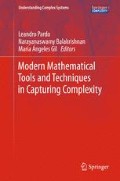Summary
In real-life situations experimental data can arise which do not derive from exact measurements or observations, but they correspond to ranges, judgements, perceptions or ratings often involving imprecision and subjectivity. These data are usually formalized with (and treated as) grouped or categorical/qualitative data for which the statistical analysis techniques to be applied are rather limited.
However, many of these data could be alternatively and suitably identified with either interval- or fuzzy number-valued data. This approach offers in fact mathematical languages/scales allowing us to express many imprecise data related either to ranges/fluctuations or to judgements/perceptions/ratings, and to capture the underlying imprecision, subjectivity and variability. Besides capturing the information surrounding the imprecision, subjectivity and variability (which is frequently ignored in dealing with grouped or categorical data), the use of the rich interval and fuzzy scales enables to state distances between data with a meaning similar to that for numerical ones. Moreover, it will possible to develop statistical methods based on these distances and exploiting the added information.
This paper aims to review the key ideas in this approach as well as some of the existing techniques for the statistical analysis.
This paper has been written as a tribute to our beloved friend Marisa Menéndez. She touched us with her friendship and warm hospitality, and we have had the opportunity to share with her many wonderful personal meetings and fruitful scientific discussions. She has been always ready to help us in many respects, and we will always feel indebted to her. Thank you, Marisa, for your affection and care; you will always occupy a very special place in our hearts.
Access this chapter
Tax calculation will be finalised at checkout
Purchases are for personal use only
Preview
Unable to display preview. Download preview PDF.
References
Araujo, A., Giné, E.: The Central Limit Theorem for Real and Banach Valued Random Variables. Wiley, New York (1980)
Artstein, Z., Vitale, R.A.: A strong law of large numbers for random compact sets. Ann. Probab. 3, 879–882 (1975)
Aumann, R.J.: Integrals of set-valued functions. J. Math. Anal. Appl. 12, 1–12 (1965)
Blanco, A.: Análisis estadístico de un nuevo modelo de regresión lineal flexible para intervalos aleatorios. PhD Thesis, University of Oviedo, Spain (2009), http://bellman.ciencias.uniovi.es/SMIRE/Archivos/Teseo-ABlanco.pdf
Colubi, A., López-Díaz, M., Domínguez-Menchero, J.S., Gil, M.A.: A generalized strong law of large numbers. Prob. Theor. Rel. Fields 114, 401–417 (1999)
Gil, M.A., Lubiano, M.A., Montenegro, M., López-García, M.T.: Least squares fitting of an affine function and strength of association for interval data. Metrika 56, 97–111 (2002)
Giné, E., Zinn, J.: Bootstrapping general empirical measures. Ann. Probab. 18, 851–869 (1990)
González-Rodríguez, G., Colubi, A., Gil, M.A.: Fuzzy data treated as functional data. A one-way ANOVA test approach. Comp. Statist. Data Anal (2010), doi:10.1016/j.csda.2010.06.013 (in press)
González-Rodríguez, G., Colubi, A., Gil, M.A., D’Urso, P.: An asymptotic two dependent samples test of equality of means of fuzzy random variables. In: Proc 17th Conf IASC-ERS (COMPSTAT 2006), Roma, pp. 689–695 (2006)
Körner, R.: An asymptotic α-test for the expectation of random fuzzy variables. J. Stat. Plann. Infer. 83, 331–346 (2000)
Laha, R.G., Rohatgi, V.K.: Probability Theory. Wiley, New York (1979)
Ledoux, M., Talagrand, M.: Probability in Banach Spaces: Isoperimetry and Processes. Springer, Berlin (1991)
Lubiano, M.A.: Medidas de Variación de Elementos Aleatorios Imprecisos. PhD Thesis, University of Oviedo, Spain (1999), http://www.tesisenred.net/TESIS_UOV/AVAILABLE/TDR-0209110-122449//UOV0067TMALG.pdf
Lubiano, M.A., Gil, M.A., López-Díaz, M., López-García, M.T.: The \(\overrightarrow\lambda\)-mean squared dispersion associated with a fuzzy random variable. Fuzzy Sets and Systems 111, 307–317 (2000)
Lubiano, M.A., Trutschnig, W.: ANOVA for Fuzzy Random Variables Using the R-package SAFD. In: Borgelt, C., González-Rodríguez, G., Trutschnig, G., Lubiano, M.A., Gil, M.A., Grzegorzewski, P., Hryniewicz, O. (eds.) Combining Soft Computing and Statistical Methods in Data Analysis. AICS, vol. 77, pp. 449–456. Springer, Heidelberg (2010)
Molchanov, I.: On strong laws of large numbers for random upper semicontinuous functions. J. Math. Anal. Appl. 235, 349–355 (1999)
Molchanov, I.: Theory of Random Sets. Springer, Berlin (2005)
Montenegro, M.: Estadística con datos imprecisos basada en una métrica generalizada. PhD Thesis, University of Oviedo, Spain (2003), http://www.tesisenred.net/TESIS_UOV/AVAILABLE/TDR-0209110-120109//UOV0066TMMH.pdf
Montenegro, M., Casals, M.R., Lubiano, M.A., Gil, M.A.: Two-sample hypothesis tests of means of a fuzzy random variable. Inform. Sci. 133, 89–100 (2001)
Montenegro, M., Colubi, A., Casals, M.R., Gil, M.A.: Asymptotic and Bootstrap techniques for testing the expected value of a fuzzy random variable. Metrika 59, 31–49 (2004)
Montenegro, M., López-García, T., Lubiano, M.A., González-Rodríguez, G.: A dependent multi-sample test for fuzzy means. In: Abst. 2nd Workshop ERCIM Working Group on Computing & Statistics (ERCIM 2009), Limassol, Cyprus, vol. 102 (2009)
Nguyen, H.T.: A note on the extension principle for fuzzy sets. J. Math. Anal. Appl. 64, 369–380 (1978)
Puri, M.L., Ralescu, D.A.: Strong law of large numbers for Banach space-valued random sets. Ann. Probab. 11, 222–224 (1983)
Puri, M.L., Ralescu, D.A.: The concept of normality for fuzzy random variables. Ann. Probab. 11, 1373–1379 (1985)
Puri, M.L., Ralescu, D.A.: Fuzzy random variables. J. Math. Anal. Appl. 114, 409–422 (1986)
Terán, P.: A strong law of large numbers for random upper semicontinuous functions under exchangeability conditions. Statist. Prob. Lett. 65, 251–258 (2003)
Trutschnig, W., González-Rodríguez, G., Colubi, A., Gil, M.A.: A new family of metrics for compact, convex (fuzzy) sets based on a generalized concept of mid and spread. Inform. Sci. 179, 3964–3972 (2009)
Zadeh, L.A.: The concept of a linguistic variable and its application to approximate reasoning, Part 1. Inform. Sci. 8, 199–249 (1975); Part 2. Inform. Sci. 8, 301–353; Part 3. Inform. Sci. 9, 43–80
Author information
Authors and Affiliations
Editor information
Editors and Affiliations
Rights and permissions
Copyright information
© 2011 Springer-Verlag Berlin Heidelberg
About this chapter
Cite this chapter
Corral, N., Gil, M.Á., Gil, P. (2011). Interval and Fuzzy-Valued Approaches to the Statistical Management of Imprecise Data. In: Pardo, L., Balakrishnan, N., Gil, M.Á. (eds) Modern Mathematical Tools and Techniques in Capturing Complexity. Understanding Complex Systems. Springer, Berlin, Heidelberg. https://doi.org/10.1007/978-3-642-20853-9_31
Download citation
DOI: https://doi.org/10.1007/978-3-642-20853-9_31
Publisher Name: Springer, Berlin, Heidelberg
Print ISBN: 978-3-642-20852-2
Online ISBN: 978-3-642-20853-9
eBook Packages: EngineeringEngineering (R0)

